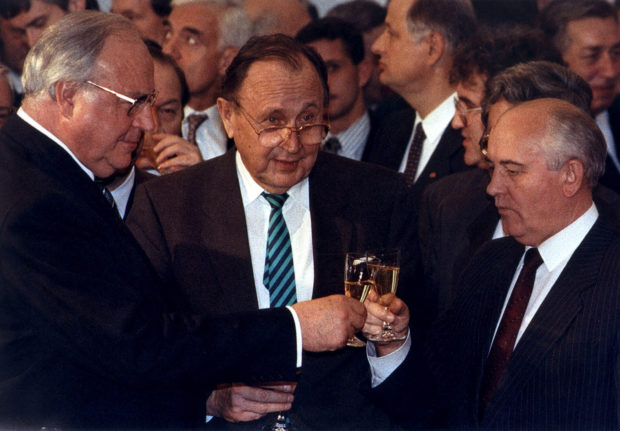Kremlin: Gorbachev changed history, but romanticism about the West was not justified

Helmut Kohl (L) toasts with former Soviet leader Mikhail Gorbachev (R) and former German Foreign Minister Hans-Dietrich Genscher (C) in this November 1990 file photo. REUTERS FILE PHOTO
The Kremlin described former Soviet leader Mikhail Gorbachev on Wednesday as a statesman who had altered world history, but said his “romanticism” about prospects for a rapprochement with the West had been misplaced.
“Gorbachev was a politician and statesman who had a huge impact on the course of world history. He led our country during a period of complex, dramatic changes and large-scale foreign policy, economic and social challenges,” President Vladimir Putin said in a condolence telegram.
Putin, who was serving in the Soviet Union’s KGB security service when Gorbachev was in power, said the former leader had “deeply understood” that the Soviet system needed to be reformed and “strove to offer his solutions to urgent problems.”
Gorbachev died on Tuesday, aged 91. His reforms heralded the end of the Cold War but also hastened the collapse of the Soviet Union after less than seven years in power.
Revered in the West, his legacy at home is more complicated, with many Russians blaming him for the chaotic economic upheaval and fall in living standards which followed.
Unjustified romanticism
Speaking at a forum in Moscow on Wednesday, Kremlin spokesman Dmitry Peskov said Gorbachev’s hopes for a “romance” with the West were unjustified and had to be corrected under Putin.
“He sincerely wanted to believe that the Cold War would end, and that it would usher in a period of eternal romance between a new Soviet Union and the world, the West,” Peskov said.
“This romanticism was not justified. There was no romantic period, the honeymoon did not work out and the bloodthirstiness of our opponents showed itself. It’s good that we realised this in time and understood it,” he added.
RELATED STORIES
Timeline: The Gorbachev era and the collapse of the Soviet Union
Last Soviet leader Mikhail Gorbachev, who ended the Cold War, dies aged 91
Shall we be a country with many histories?